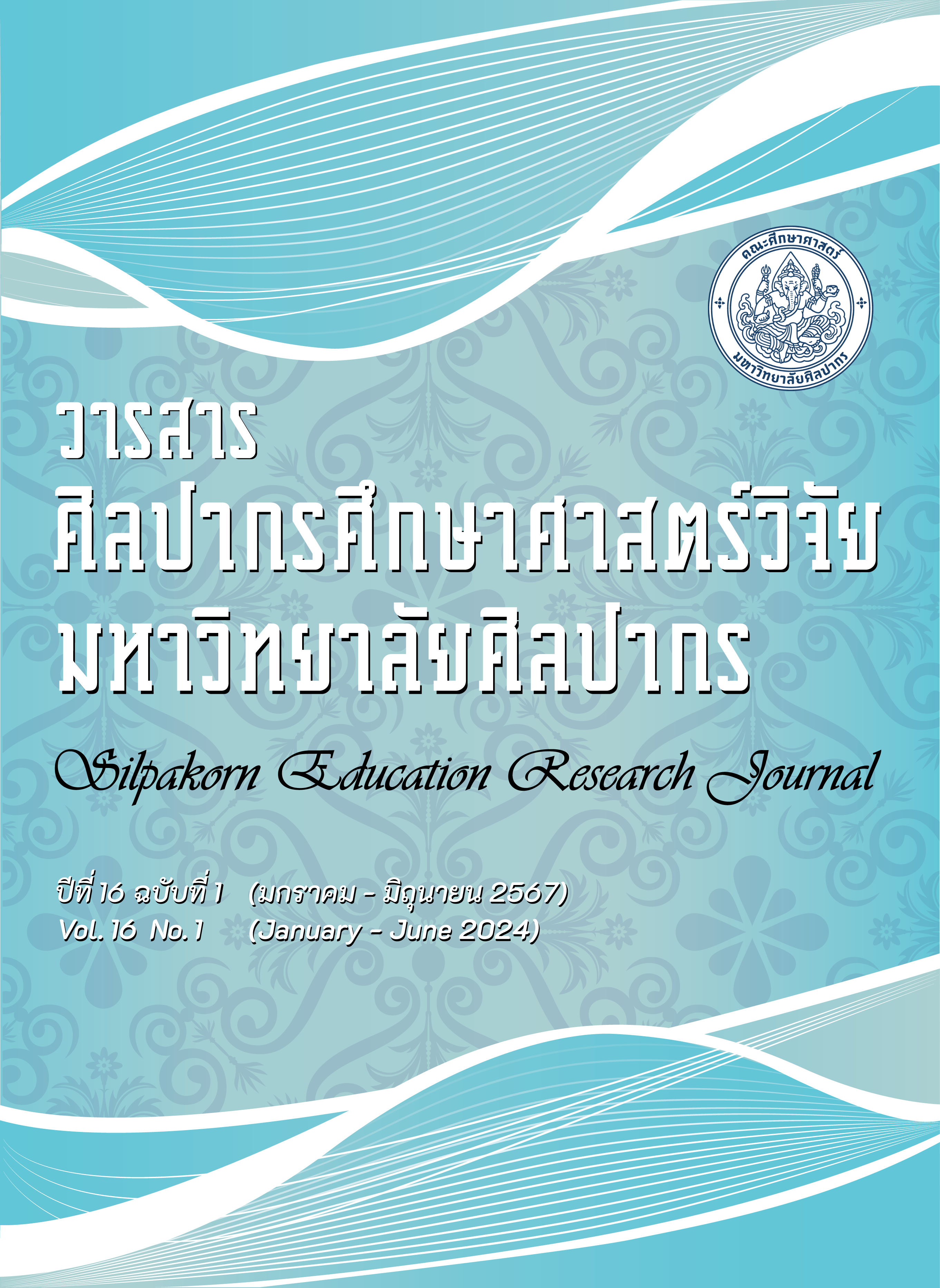ความต้องการจำเป็นของการบริหารงานวิชาการ โรงเรียนมัธยมศึกษาเอกชนตามแนวคิดภาวะผู้นำในตนเอง
คำสำคัญ:
ความต้องการจำเป็น, การบริหารงานวิชาการ, ภาวะผู้นำในตนเองบทคัดย่อ
การศึกษาครั้งนี้มีวัตถุประสงค์เพื่อ 1) ศึกษาระดับภาวะผู้นำในตนเองของนักเรียนมัธยมศึกษาเอกชน และ 2) ศึกษาความต้องการจำเป็นในการพัฒนาการบริหารวิชาการโรงเรียนมัธยมศึกษาเอกชนตามแนวคิดภาวะผู้นำในตนเอง เป็นการวิจัยเชิงเชิงปริมาณ ผู้ให้ข้อมูลประกอบด้วย นักเรียนมัธยมศึกษาเอกชน จำนวน 1,865 คน และผู้บริหารและครูโรงเรียนมัธยมศึกษา จำนวน 932 คน เครื่องมือที่ใช้ในการวิจัย คือ แบบวัด และแบบสอบถาม วิเคราะห์ข้อมูลโดยใช้ค่าความถี่ ร้อยละ ค่าเฉลี่ย ส่วนเบี่ยงเบนมาตรฐาน และดัชนีความต้องการจำเป็น
ผลการวิจัยพบว่า 1) ระดับภาวะผู้นำในตนเองของนักเรียนด้านที่สูงที่สุด 3 ลำดับ คือ การมีคุณธรรมในตนเอง รองลงมาคือ การสร้างแรงจูงใจในตนเอง และการพัฒนาตนเอง ตามลำดับ และ 2) การพัฒนาการบริหารวิชาการ กระบวนการที่มีความต้องการจำเป็นสูงที่สุด คือ การออกแบบการจัดการเรียนรู้
เอกสารอ้างอิง
Alqefari, A. (2010). A Study of Programmers for Gifted Students in The Kingdom of Saudi Arabia. [Doctoral dissertation, Brunel University].
Bangthamai, E. (2018). “Development of a Problem - Based Teaching Activity Model to Promote Problem-Solving Ability in the Digital Photography Course”. Veridian E-Journal Silpakorn University 11(1). (in Thai)
Cautela, J. R. (1969). “A Classical Conditioning Approach to the Development and Modification of Behavior in The Aged”. The Gerontologist 9: 109 - 113.
Chaemchoy, S. (2017). Leadership in Administration and Educational Quality Assurance. Department of Educational Administration Department of Management Policy and Educational Leadership, Faculty of Education, Chulalongkorn University. (in Thai)
Chantarachote, S., Hatthasak, M. and Nugkim, K. (2023). “The Effect of Empowering Program on Leadership Development in Secondary Five Students”. Journal of MCU Ubon Review 8(2). (in Thai)
Wongwanich, S. (2023). “A Development of an Entrepreneurship Enhancement Program for Junior High School Students Using Design Based Research”. STOU Educational Journal 16(1). (in Thai)
Durnali, M. (2020). “The Effect of Self - Directed Learning on the Relationship Between Self -Leadership and Online Learning Among University Students in Turkey”. Tuning Journal for Higher Education 8(1): 129 - 165.
Ghosh, K. (2015). “Developing Organizational Creativity and Innovation: Toward a Model of Self-Leadership, Employee Creativity, Creativity Climate and Workplace Innovative Orientation”. Management Research Review 38(11): 1126 - 1148.
Krejcie, R.V. and Morgan, D.W. (1970). “Determining Sample Size for Research Activities”. Educational and Psychological Measurement 30: 607 - 610.
Lemeshow, S., Hosmer Jr., D.W., Klar, J. and Lwanga, S.K. (1990). Adequacy of Sample Size in Health Studies. Chichester: John Wiley and Sons.
Manz, C. C. (1983). The Art of Self-Leadership: Strategies for Personal Effectiveness in Your Life and Work. Prentice - Hall.
Manz, C. C. (1986). “Self-Leadership: Toward an Expanded Theory of Self-Influence Processes in Organizations”. The Academy of Management Review 11(3): 585 - 600.
Manz, C. C. and Neck, P. C. (2004). Mastering Self-Leadership: Empowering Yourself for Personal Excellence. Upper Saddle River, NJ: Prentice-Hall.
Manz, C. C. and Sims, P. H. (1980). “Self - Management as a Substitute for Leadership: A Social Learning Perspective”. Academy of Management Review 5: 361 – 367.
Dondi, M., Klier, J., Panier F. and Schubert, J. (2021). Defining the Skills Citizens Will Need in the Future World of Work. McKinsey Company. [Online]. Retrieved October 20, 2023, fromhttps://www.mckinsey.com/industries/public-and-social-sector/our-insights/defining-the-skills-citizens-will-need-in-the-future-world-of-work.
Nantharojphong, K. and Siriwong, P. (2018). “The Social Construction of Meanings, Source of Meanings and Self - Leadership Development Process of Generation Z: Research for Constructing Grounded Theory”. Journal of Education Studies Chulalongkorn University 46(3). (in Thai)
National Council for Higher Education, Science, Research and Innovation Policy. (2021). Report on the Development of the Country's Higher Education, Science, Research and Innovation in 2021: Recovery from the COVID-19 Crisis. Toward Sustainability, Printable Publishing House. (in Thai)
Office of the Basic Education Commission. (2010). National Education Act B.E. 2542 and its Amendments (No. 3) B.E. 2010. Office of the Prime Minister. (in Thai)
Office of the Basic Education Commission. (2011). Implementation of Integration of Small Schools to Support Educational Reform in the Second Decade. Ministry of Education. (in Thai)
Parakhina, V., Boris, O. and Strielkowski, W. (2019). Self-Management. 1st ed. Moscow State University Named After Lomonosov.
Srisa-at, B. (2004). Teaching Development. Suviriyasanas Co., Ltd. (in Thai)
Wongwanich, S. (2015). Needs Assessment Research. Chulalongkorn University Publishing House. (in Thai)





